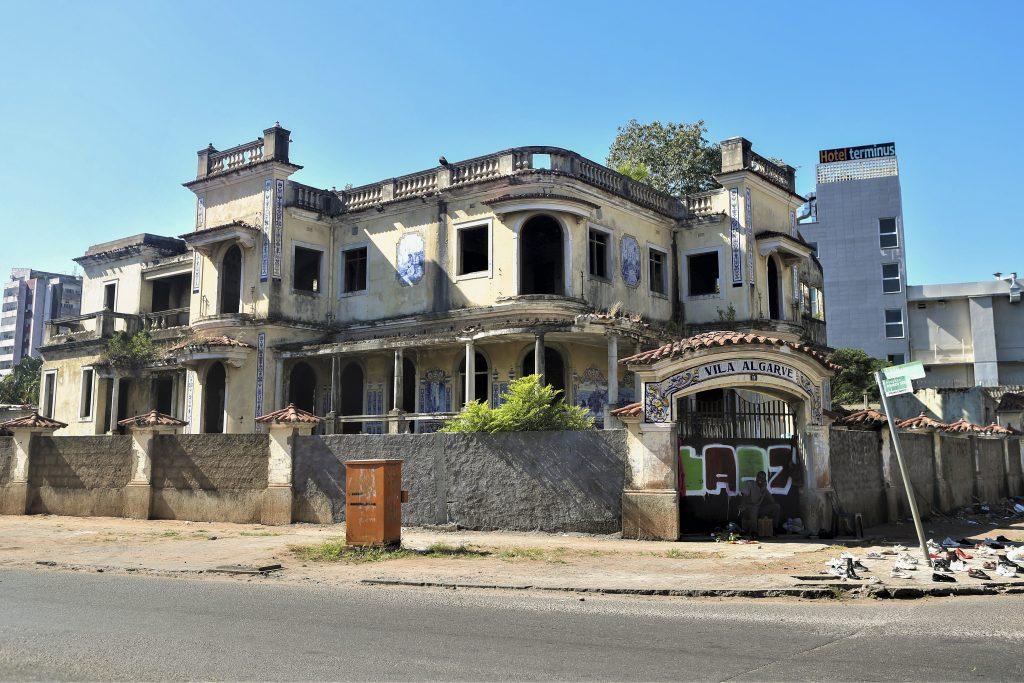Africa-Press – Mozambique. The abandoned Vila Algarve building, a classified property in the centre of Maputo which served as a PIDE prison during the colonial period, is to be transformed into a museum-hotel, according to information from the Mozambican Government consulted by Lusa on Sunday.
According to the contract award announcement, the Ministry of Combatants has granted Giluba-Lin the project for the preparation, refurbishment of the building, and operation of the museum-hotel in the building known as Vila Algarve.”
The work on the building, which is in an advanced state of decay, located at number 10 on the corner of Avenida dos Mártires de Machava and Avenida Ahmed Sekou Touré, in central Maputo, is foreseen in a tender comprising two stages, reads the contract award document.
At present, all entrances to the ‘Vila Algarve’, built in 1934 in the heart of Maputo, expanded in 1950 and now classified as a Property of Architectural Interest, are bricked up, protecting the interior from occupation by homeless people, as has happened in previous years.
Of the once-imposing house in central Maputo, decorated with extensive mosaics depicting naturalistic motifs, little remains today beyond walls, ceilings and some roofs — but also the dark stories of the colonial period, when the International and State Defence Police (PIDE) confiscated the Vila Algarve and used it as a site for the torture of those then fighting for Mozambican independence.
Stories such as those portrayed by renowned Mozambican poet José Craveirinha (1922–2003) in his poems “Não sei se é uma medalha” (1967) and the two versions of “Vila Algarve” (1988 and 1998), written about the period when he was detained there and subjected to PIDE interrogation.
On 25 June 1975, Mozambique proclaimed its independence, but in the years that followed, abandonment, decay and the ‘ghosts’ of what had taken place there took over Vila Algarve. Even the Mozambican Bar Association attempted, unsuccessfully, in 2008 to turn the space into its headquarters.
A state-owned property, Vila Algarve was, in 2011 under consideration to become the site for the future Museum of the Liberation Struggle, but like all previous projects, it did not move forward.
Even Joaquim Chissano, Mozambican President from 1986 to 2005, tried, when he was Minister of Foreign Affairs in the country’s first government, to house that ministry there.
“I tried to use Vila Algarve. I was not well understood. And then other entities came along that wanted to use Vila Algarve, and the intention was to preserve the place. At that time, it was to make it an environment of peace, of solidarity, or even to be used as the ministry itself. As we did not have suitable buildings at the time, it was a way to preserve it,” recalled the former President of the Republic in June, in an interview with Lusa.
“And I always wanted the Combatants of the National Liberation Struggle to be there too, as their headquarters. We did not succeed, for various reasons. Hopefully, someone will truly manage to restore and preserve this historic piece. It is a very important historical piece,” said Chissano.
Ghosts of the past continue to hover over Vila Algarve, whose abandonment historian Marlino Mubai, professor at Eduardo Mondlane University (UEM), cannot understand.
“It is intimately linked to Mozambique’s history from the point of view of the struggle against colonial domination, fascist domination in particular,” said the historian, in an earlier interview with Lusa, lamenting a succession of failed projects and intentions.
As a place that “connects” Mozambique and Portugal, Mubai argued even then that the two countries should join efforts, as was once considered in the past: “They could rehabilitate that space, which indeed recalls a very difficult past shared by both peoples, but from which new bonds of brotherhood were forged between the peoples who today continue to sustain Mozambican and Portuguese diplomacy.”
For More News And Analysis About Mozambique Follow Africa-Press






